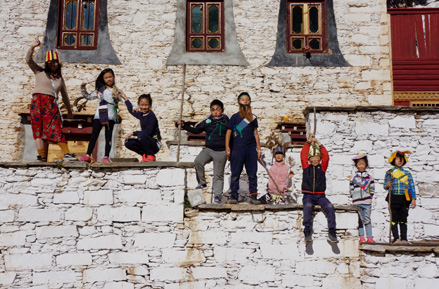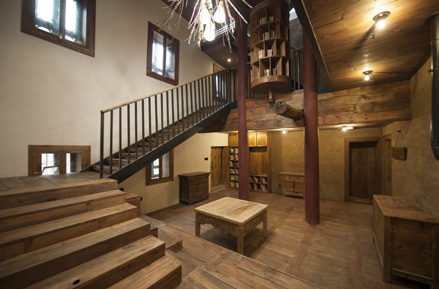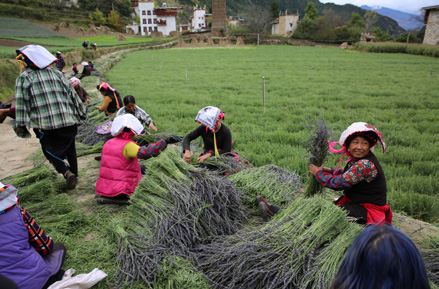Long term sustainable developer Liu Xian was invited to Zhonglu township in Sichuan in 2015 to investigate the education situation there, and in the course of the trip came up with the idea of establishing a forest school. The plan was for it to be set up in a mountainous region next to the river valley in a provincial nature reserve. Houses in traditional Tibetan Jiarong villages are stacked up against the mountainside, with ancient towers scattered in their midst. The forest school was to be positioned at the highest point, between a well-preserved Tibetan-style residential house and another residential house, on a four mu open space. In October 2018, the school opened with the name Denglong Yunhe, meaning Lantern and Cloud, having been fully planned, designed and renovated. When the plan for a forest school first came up in 2015, founder Liu Xuan hoped it could be used to demonstrate nature education and build communi-ty while working towards ecological protection. Over the past five years, the forest school has achieved a lot in nature education, social enterprise and rural revitalization, winning credit as a "Sichuan Nature Education Base", and "Sichuan Primary and Middle School Experimental Research Base" and earning a "Rural Ecological Contribution Prize" and "Plateau Social Enterprise Award". With the combined effort of villagers, Zhonglu township has turned into a rural revitalization demonstration base.

NATURE EDUCATION: WHOLE PERSON DEVELOPMENT AND URBAN RURAL INTEGRATION
From the beginning, nature education was the direction Liu Xuan was interested in for the school. She wanted to cultivate a harmonious relationship between people, and between people and nature and for local students to be the main beneficiaries. She wanted education at the school to be global, not just about China, as nature conservation concerns the whole world. She also wanted to establish a unique curriculum that would focus on whole person development. Five years on, and the forest school has a clear identity now. It is a future-focused endeavor that practices local innovative education and conducts interdisciplinary deep learning. The school tackles four themes in its own curriculum: the study of nature, self-exploration, free change and local education centered on natural ecology and environmental protection, allowing learners to use logical and rational scientific thinking, explore inner wisdom, learn to solve practical problems, and have a positive impact on the world. The learners include students at home and abroad, parent-child duos, young innovators, new farmers, wise elders, local villagers, and returning youth.

A play dedicated to the holy mountain of Moerduo
In a beautiful environment with rich natural resources, the school has launched a series of natural education courses and activities for children. Local children can learn all about their hometown, and visiting children have the chance to experience nature. They learn to identify plants and pick mushrooms with a guide. They can climb the watchtower to learn about local history. They can learn embroidery and weaving with folk craftsmen. The school conducts research and practice on a series of eco-environmental issues such as eco-toilets, new energy utilization, sewage and garbage disposal, and ecological agriculture in local villages, and hold a “Crazy Corn Festival” focused on local customs. The school has become a cross-border exchange platform, attracting local residents, policy makers, designers and those in other fields to discuss rural development and environmental protection in China.

Main area
COMMUNITY DEVELOPMENT: USING MODERN METHODS TO PROTECT NATURE AND TRADITIONS

Lavender harvest
For forest schools, community development is still an educational proposition, that is, how to change the behavior of development by changing villagers' perceptions. The forest school promoted the establishment of the first ecotourism-led farm cooperative in Danba county, and used this to promote the “protocol protection” system with villagers. That is, by signing an agreement with the cooperative, community members are encouraged to commit to water protection, garbage classification, and proper land use. These community members will first enter the cooperative for skills training and employment opportunities. This system will allow them to stay in their hometown with dignity and achieve environmental protection and cultural heritage. With this system, the forest school allows local communities to enjoy more development dividends, such as:
(1) Economic benefit flow: During the school’s building and renovation, 45 local craftsmen were hired, allowing them to reap the rewards of labor and the opportunity to communicate with outside designers. Each homestay will receive research trip participant, and the school will put on in-depth ecological activities to allow more villagers to participate.
(2) Stronger community capacity: With the help of agricultural tourism cooperatives, the forest school has formed closer cooperation with local communities. While constantly improving the management mechanism, it also guides the tourism industry here to change: let local tourism upgrade from the past farmers' individual participation to organized and organized The ultimate hope of the collective participation of management is that local communities can achieve independent operation as soon as possible.
(3) Training and promotion: The forest school organizes ecotourism training, nature guide training and local catering training for villagers, focusing on the young people who choose to return to their hometowns after graduation, with the hope of working in local tourism. In view of the most precious traditional culture in Tibetan townships, the school focuses on protection and promotion, including the design of handicrafts during study trips, and the establishment of communication channels for cooperatives.